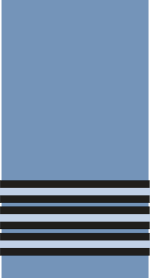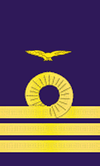Wing commander (rank)

Wing commander (Wg Cdr in the RAF, the IAF, and the PAF, WGCDR in the RNZAF and RAAF, formerly sometimes W/C in all services) is a commissioned rank in the Royal Air Force[1] and the air forces of many other Commonwealth countries. It ranks immediately above squadron leader and immediately below group captain.
It has a NATO ranking code of OF-4, and is equivalent to a commander in the Royal Navy or a lieutenant colonel in the British Army or the Royal Marines.
The equivalent rank in the Women's Auxiliary Air Force, Women's Royal Air Force (until 1968), and Princess Mary's Royal Air Force Nursing Service (until 1980) was "wing officer". The equivalent rank in the Royal Observer Corps (until 1995) was "observer commander" which had a similar rank insignia.
Origins

On 1 April 1918, the newly created RAF adopted its officer rank titles from the British Army, with Royal Naval Air Service commanders (titled as wing commanders) and Royal Flying Corps lieutenant colonels becoming lieutenant colonels in the RAF. In response to the proposal that the RAF should use its own rank titles, it was suggested that the RAF might use the Royal Navy's officer ranks, with the word "air" inserted before the naval rank title. For example, the rank that later became wing commander would have been air commander.
Although the Admiralty objected to this simple modification of their rank titles, it was agreed that the RAF might base many of its officer rank titles on naval officer ranks with differing pre-modifying terms. It was also suggested that RAF lieutenant colonels might be entitled reeves or wing-leaders. However, the rank title wing commander was chosen as wings were typically commanded by RAF lieutenant colonels and the term wing commander had been used in the Royal Naval Air Service. The rank of wing commander has been used continuously since 1 August 1919.
Usage
In the early years of the RAF, a wing commander commanded a flying wing, typically a group of three or four aircraft squadrons. In current usage a wing commander is more likely to command a wing which is an administrative sub-division of a station. In the Air Training Corps, a wing commander is the officer commanding of a wing.[citation needed]
Insignia and command flag
The rank insignia is based on the three gold bands of commanders in the Royal Navy and consists of three narrow light blue bands over slightly wider black bands. This is worn on both the lower sleeves of the tunic or on the shoulder of the flying suit or the casual uniform.
The command pennant is two triangular command pennants used in the RAF. Two thin red lines differentiate this one from the other.
During 1941-45 Fighter Command's wing leaders (of wing commander rank) were also allowed to use their own initials as aircraft identification letters on their personal aircraft, e.g., Wing Commander Roland Beamont's personal Hawker Tempest, JN751, was coded "R-B", Wing Commander John Robert Baldwin's personal Hawker Typhoon was coded "J-B".
-

An RAF wing commander's sleeve/shoulder insignia
-

An RAF wing commander's sleeve mess insignia
-

An RAF wing commander's command pennant
-

An RAF wing commander's sleeve on No. 1 service dress uniform
Other air forces
The rank of wing commander is also used in a number of the air forces in the Commonwealth, including the Bangladesh Air Force, Ghana Air Force, Nigerian Air Force, Indian Air Force, Pakistan Air Force, Royal Australian Air Force, Royal New Zealand Air Force, and the Sri Lankan Air Force. It is also used in the Egyptian Air Force, Hellenic Air Force, Royal Air Force of Oman and the Royal Thai Air Force.
-

An RAAF wing commander's sleeve/shoulder insignia
-

A Hellenic Air Force antisminarchos (wing commander's) rank insignia
-

An Indian Air Force wing commander's rank insignia
-

A RTAF wing commander's rank insignia
-

A Pakistan Air Force wing-commander's rank insignia.
Royal Canadian Air Force
The Royal Canadian Air Force (RCAF) used the rank until the unification of the Canadian Forces (CF) in 1968, when army-type rank titles were adopted. A Canadian wing commander then became a lieutenant-colonel. In official French Canadian usage, a wing commander's rank title was lieutenant-colonel d'aviation. The rank of wing commander continues to be used as a cadet rank at the Royal Military College of Canada.
In the 1990s, the Canadian Forces Air Command (the post-1968 RCAF) altered the structure of those bases under its control, redesignating them as wings. The commander of such an establishment was re-designated as the "wing commander" (or Wg Comd). Like the United States Air Force usage, the term "wing commander" (as used in the modern Canadian Forces) is an appointment, not a rank. A "wing commander" usually holds the rank of colonel.
United States Air Force
In the United States Air Force (USAF) wing commander is a duty title, not a rank. The equivalent USAF rank is lieutenant colonel who typically has command of a squadron. Because USAF wings are larger formations than RAF wings, the commander of a wing must hold at least the rank of colonel, and is typically a colonel or a brigadier general. The one exception to this is the commander of the 59th Medical Wing (Wilford Hall Medical Center) who is customarily a major general.
Civil Air Patrol (United States Air Force Auxiliary)
The Civil Air Patrol, the volunteer auxiliary of the USAF, follows the USAF rank structure. CAP divides the nation into 52 wings (each corresponding to a state, territory, and District of Columbia). Each wing is headed by a CAP colonel, who holds the position of wing commander.
Notable wing commanders
- M. Hamidullah Khan, commander - Sector 11, Bangladesh Forces, War of Independence 1971, first Provost Marshal and Commander of Ground Defense Command of Bangladesh Air Force. After retirement in 1979, joined BNP and embarked on a political career. Remained active until death on December 30, 2011.
- Guy Gibson, commanding officer of 617 Squadron and leader of the "Dam Busters" raid.
- Adrian Warburton, legendary for his role as a reconnaissance aviator in the defence of Malta; shot down over Germany on 12 April 1944, aged 26. It was only in 2002 that his remains were found in wreckage of his plane.
- Roland Beamont, Second World War fighter pilot and post-war test pilot.
- Pierre Clostermann, Second World War fighter pilot and author of The Big Show.
- Andy Green, current holder of the land speed record and first person to break the sound barrier on land.
- Roald Dahl, Second World War fighter pilot, and famous novelist. His record of five aerial victories has been confirmed by post-war research and cross-referenced in Axis records. (He ended the war with the temporary rank of Wing Commander; substantive rank was squadron leader)
- Dennis Wheatley, the popular historical novelist and thriller writer was granted a commission and brought into Whitehall's Second World War Joint Planning Staff.
- Paddy Finucane, top ranking RAF World War 2 ace with 32 kills. A native of Rathmines, Dublin, Ireland (who emigrated to Britain with his family in 1936), he is the youngest Wing Commander in the history of the RAF. He was promoted to the rank in 1942 at age 21 and was shot down and killed shortly thereafter.
- Humphrey de Verd Leigh, inventor of the Leigh light which was developed to spotlight U-boats as they surfaced at night. The Leigh light is reputed to have changed the course of the Battle of the Atlantic in World War 2.
- Douglas Bader, Second World War fighter pilot and double amputee, was the first commander to lead formations of three or more squadrons during the Battle of Britain.
- Roly Falk, test pilot on the maiden flight of the Avro Vulcan.
- Mervyn Middlecoat, fighter pilot belonged to Pakistan Air Force.
- Abdel Latif Boghdadi, pilot in the Egyptian Air Force turned politician
- Ken Wallis, Second World War fighter pilot, aircraft engineer, and multiple world record holder in autogyro aircraft flight
- Kambampati Nachiketa, war veteran of the Kargil War
See also
- RAF officer ranks
- Comparative military ranks
- Wing Commander, a popular computer game series.
References
- ↑ "RAF - Commissioned Ranks". Royal Air Force. 2011. Retrieved 2011-06-17.
| Commissioned officer ranks of the British Armed Forces | |||||||||||||
|---|---|---|---|---|---|---|---|---|---|---|---|---|---|
| NATO rank code | Student Officer | OF-1 | OF-2 | OF-3 | OF-4 | OF-5 | OF-6 * |
OF-7 ** |
OF-8 *** |
OF-9 **** |
OF-10 ***** | ||
| Royal Navy | O Cdt | Mid | SLt | Lt | Lt Cdr | Cdr | Capt | Cdre | RAdm (list) |
VAdm (list) |
Adm (list) |
Adm of the Fleet | |
| Royal Marines | 2Lt | Lt | Capt | Maj | Lt Col | Col | Brig | Maj-Gen | Lt-Gen | Gen (list) | |||
| Army | O Cdt | 2Lt | Lt | Capt | Maj | Lt Col | Col | Brig | Maj-Gen (list) |
Lt-Gen (list) |
Gen (list) |
FM | |
| Royal Air Force | OC / SO | APO / Plt Off | Fg Off | Flt Lt | Sqn Ldr | Wg Cdr | Gp Capt | Air Cdre | AVM | Air Mshl | Air Chf Mshl (list) |
MRAF | |